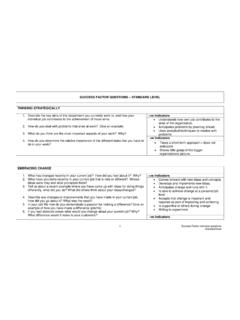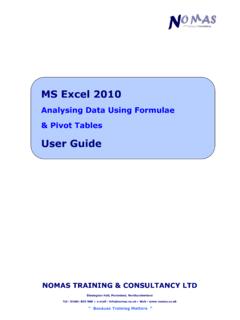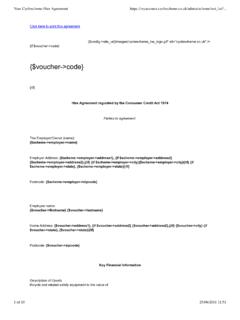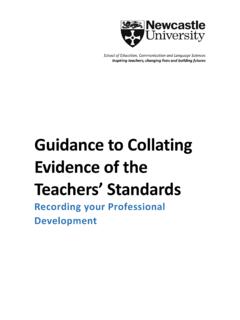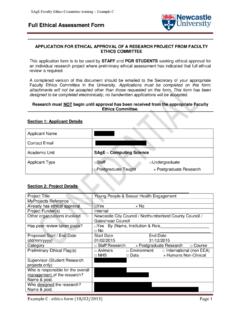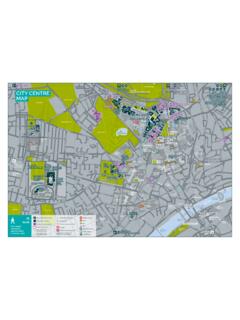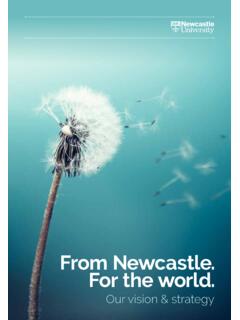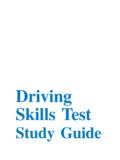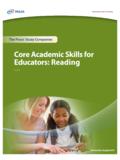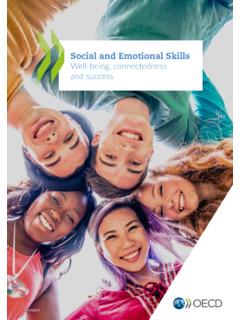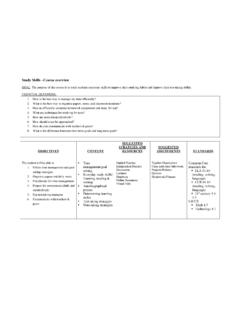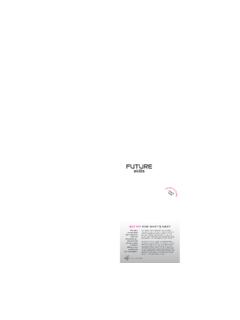Transcription of Study Skills Guide - ncl.ac.uk
1 St/G/2004 Study Skills GuideDisability Support ServiceUniversity of Newcastle upon Tyne Skills GuideDisability Support ServiceUniversity of Newcastle upon Tyne Styles.. 3 Learning Styles Questionnaire.. 3 Study Strategies for Different Learning Styles .. 5 Multi-Sensory Learning .. 6 Time Management and Organisation. 7 Problems and Solutions .. 7 Study / Revision Planner .. 8 Making and Using Notes.. 9 General Tips .. 9 Note Taking Methods.. 10 Lectures .. 11 Making Notes from Books .. 11 Organising Your Notes .. 12 Reading Skills .. 13 Information Searching .. 13SQ3R .. 14 Clue Words to Help You Read .. 15 Problems .. 16 Essay Writing.. 17 Identifying Key Verbs in Essay Questions .. 18 Research Skills .. 19 Planning.
2 20 Structure .. 21 Useful Words and Phrases.. 22 Report Writing.. 23 Planning a Report.. 23 Research.. 24 Report Structure .. 25 Science Writing.. 26 Report Format .. 26 Analyse the Arguments .. 26 Look at the Methods Used .. 26 Question the Conclusions.. 27 Other Points to Remember .. 27 Key Verbs .. 28 Dissertation Structure.. 29 Writing a Literature Review .. 30A Critical Approach to Writing.. 31 General Tips .. 31 Signal Words.. 32A Basic Guide to Referencing.. 33 Harvard System .. 33 British Standard System.. 33 Plagiarism .. 34 Examinations.. 35 Revision .. 35 Memory .. 35 Timed Examinations.. 36 Preparing for Oral Presentations.. 37 Spelling, Grammar and Punctuation .. 38 Multi Sensory Techniques for Spelling .. 39 Basic Rules of Grammar.
3 39 Punctuation Guide .. 40 Information Technology.. 41 TextHelp Read & Write .. 41 Inspirations.. 42 References.. 433 Learning StylesAt University you will be expected to be an independent learner. Therefore, it is advisable tothink carefully about your learning style and how best you can use your learning strengths tosupport your academic studies. Use this part of the Guide to help you: To think about the different ways you perceive and understand information; Consider your most appropriate learning environment; To identify how you process information most effectively; To identify different strategies and Skills that will benefit you as a learner; To understand multi-sensory Styles QuestionnaireTick the response which best suits Do you usually remember more from a lecture when:a) You do not take notes, but listen very carefullyb) You sit near the front of the room and watch the lecturerc) You take notes2.
4 Do you usually solve a problem by:a) Talking to yourself or a friendb) Using an organised, systematic approach like lists, ) Walking, pacing or some other physical activity3. Do you remember phone numbers (when you can t write them down) by:a) Repeating the numbers orallyb) Seeing or visualising the numbers in your mindc) Writing the numbers with your finger on the table or wall4. Do you find it easier to learn something new by:a) Listening to someone explain how to do itb) Watching a demonstration of how to do itc) Trying it yourself5. When you try to remember something do you:a) Try to see it happen in your mindb) Hear in your mind what was said or the noises that occurredc) Feel the way it reacted with your emotions46.
5 If you don t know how to spell a word, do you:a) Sound it outb) Try to see it work in your mindc) Write the word in several ways and choose the one that looks right7. Do you enjoy reading most when you can read:a) Dialogue between charactersb) Descriptive passages that allow you to create mental picturesc) Stories with lots of action in the beginning (because you find it difficult to concentrate early on)8. Do you remember people you have met by their:a) Namesb) Facesc) Mannerisms, movements, Are you distracted mainly by:a) Noisesb) Peoplec) Environment (temperature, comfort of furniture, etc.) you have problems sitting still to read? If so, do you:a) Talk with a friendb) Watch TV or look out of the windowc) Fidget in your chair, or can t lie still in bedCount the total number which fall into the following categoriesa).
6 Auditory (by hearing)b) .. Visual (by seeing)c) .. Kinaesthetic (by touching, doing or moving)5 Study Strategies for different learning stylesAuditoryIf you are an auditory learner, it means you will learn best by hearing information. Considermaking use of sound in the following ways: Talk or read aloud to yourself as you learn information; Talk through and/or review information with friends; Record information on to tape or disc to enable you to listen back over information; Ask a friend to read text or lecture notes aloud to you; Have music playing in the background while you read or write; Work in a silent learners often learn best from seeing information presented in diagrams, charts orpictures. Try using some of the following visual techniques: Plan work using spider diagrams, lists or tables, pictograms and mind maps; Write down all information; Use coloured pens to highlight important information when reading and to link similar ideasand arguments as you identify them (But only if you are using your own text); Use coloured paper for different modules or subjects; Use large wall charts or planners to organise your work; Try to visualise information and ideas in your mind; Vary the environment or position in which you work as this may create a link between yourvisual setting with a particular subject kinaesthetic learner will learn best by touching, doing or moving.
7 Try to think physically by: Discussing ideas with friends; Putting different arguments and ideas on separate pieces of paper when planning essays,allows you to physically organise your answer; Going over information in your mind while walking, jogging or swimming; Using colour or draw pictures and diagrams alongside written notes; Moving around your environment during independent Study LearningIt doesn t matter how you learn as long as you use the methods which suit you. However, acombination of the use of all the senses is the best way to appears that on average you will remember: 20% of what you read; 30% of what you hear; 40% of what you see; 50% of what you say; 60% of what you you will remember 90% of what you say, hear, see and learning can help anyone to enhance the experience of learning and improverecall of important information.
8 Information is received by the brain through the sensorychannels. These channels are: Visual (seeing information) Auditory(hearing information) Kinaesthetic(touching, moving or doing) Olfactory (smelling and making associations related to smell) Taste (what we experience from the mouth and tongue)Consider how strongly a smell, taste or hearing a piece of music can remind you of a previoussituation or event. This is because all your sensory channels have worked simultaneously tolink into your emotions to create that learning involves activating as many of the senses as possible at the same time toaid understanding and Study tips for effective learning Remember to take regular breaks. Create or choose an environment which suits your learning needs:- limit noise and distraction;- room temperature is not too hot or too cold;- comfortable seating arrangement;- good lighting.
9 Break large tasks into smaller manageable chunks. Eat regularly and drink plenty of water. Use technology to help you:- Personal Computer;- Tape, digital or minidisk recorders;- Assistive Management and OrganisationMisuse of time is probably the most common form of sabotage that students use toundermine their attempts to Study . However, planning your time makes you think about itstrategically and, even if you have to alter your Study plans, you will benefit from havingpreviously defined your tasks and prioritising your you are expected to be an independent learner at , make sure that you take control of your time and use it Time ProblemsPossible SolutionsAre you disorganised and frequently misplace things?Organise your learning control of whereyou work and you can then control how you work.
10 Keep a clear desktop Place pens, pencils etc in a desk tidy or jar Organise your notes by using a separate ringbinder for each subject Use coloured dividers to separate lecture notes into date order File handouts with the appropriate lecture notesPut off doing coursework andassignments Use a diary or wall planner to clearly markassignment deadlines for every module Start tasks sooner rather than later Be realistic about how long things will take andset appropriate time slots for specific tasks an essay will take longer than readinga short extract Break tasks down into manageable parts andallow time to tackle some of it every weekEasily distracted Negotiate Study time with friends and flatmatesso that they know when you are not to bedisturbed
